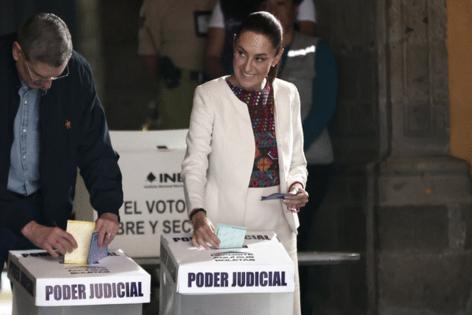Mexicans cast ballots for nation's judges in controversial, first-ever vote
Published in News & Features
MEXICO CITY — Mexican citizens went to the polls Sunday to elect thousands of judges in a historic vote championed by President Claudia Sheinbaum as an essential democratic reform — and assailed by opponents and many legal experts as a crude maneuver to consolidate ruling-party power.
The vote marked the first time that Mexico has elected judges, who until now have been appointed by review panels after passing a series of legal exams — or, in the case of Supreme Court justices, after presidential nominations.
With Sunday’s vote, experts said, Mexico became the first country worldwide to elect all of its judges.
Sheinbaum, who has assailed the current judiciary as corrupt and plagued by nepotism, gave a thumbs-up to journalists early Sunday as she and her husband arrived at a polling place in the Museum of Art in downtown Mexico City.
“Long live democracy!” she declared on X after the first couple cast their ballots.
The president has presented the judicial reform as a key component of her efforts to curb Mexican criminal cartels, a crackdown that is being closely watched by the Trump administration. But detractors predict a partisan judiciary beholden to the ruling Morena party — and even more vulnerable to bribery and infiltration by organized crime.
“This is a black Sunday,” Fernando Belaunzarán, a member of the center-right National Action Party told protesters gathered Sunday at the capital’s landmark Angel of Independence monument. “Today the system of checks and balances died. ... Today was a coup d’etat. No weapons were used, but they captured the institutions meant to safeguard democracy.”
Some opposition lawmakers called for a boycott, labeling the process a farce meant to bolster the power of Sheinbaum’s leftist Morena political bloc. Besides holding the presidency, Morena dominates Mexico’s Congress, the Mexico City government and many statehouses.
Apart from fierce polemics, the election has generated widespread confusion.
Voters faced a daunting task: Choosing 881 federal judges, more than half of the federal judiciary. Citizens had to pore over at least six separate, color-coded ballots listing more than 3,000 candidates, mostly unknown to the public. Elections are slated for 2027 to choose the remainder of the federal bench.
In addition, voters in 18 states and Mexico City were choosing some 1,800 regional judges.
Turnout seemed sluggish and delays appeared the norm Sunday at several polling sites in the capital. Voters, many of them elderly, struggled with making a choice among the wide array of candidates. Many people were taking 20 minutes or more to fill out ballots.
“I’m very upset,” said Alberto Romero Díaz, 57, a car wash owner who was waiting in line to vote in the capital. “I’ve been waiting here almost an hour. This is very badly organized.”
Many voters carried cheat sheets listing numbers corresponding to preferred candidates. Ruling party officials have denied handing out the widely distributed cheat sheets, known here as acordeones (accordions) because the guides fold like the musical instrument.
“Of course we used accordions to help us,” said Jerónimo Contreras, 42, a businessman who was accompanying his elderly parents at a polling site. “One has to enter many numbers, it’s very complicated.”
The cheat sheets, he said, indicated candidates backed by Sheinbaum’s Morena party. Voting for Morena-backed candidates, Contreras said, would ensure continuation of government financial aid and other social-assistance programs launched by the ruling party.
“If the judges are people who help Morena and the president, then everyone is on the same side — and that’s a good thing,” Contreras said.
The elections are officially nonpartisan. Contenders were not identified by party affiliation. Political parties were banned from funding candidates.
Critics said the vetting of candidates was woefully inadequate and that some candidates had ties to organized crime or other ethical shortcomings. Sheinbaum said only a few candidates appeared unqualified.
There was no immediate word on voter participation, which is viewed as a key test of the election’s validity. Turnout is widely expected to be far below the more 60% of voters who cast ballots in last year’s national balloting.
The most closely watched contest is the election of nine members of the new Supreme Court. Under the electoral reform, the nation’s highest tribunal will see both a reduction in the number of justices (from 11 currently) and new restrictions on the court’s ability to invalidate laws as unconstitutional.
The vote is the result of constitutional amendments pushed last year by former President Andrés Manuel López Obrador, who, like President Donald Trump, often chafed at court rulings blocking his initiatives. The Mexican Congress, dominated by Morena, fast-tracked the radical judicial makeover, rejecting criticisms that the move was another step toward one-party rule.
The election featured a rare public appearance by López Obrador, who cast his ballots in the southern state of Chiapas, where he retired to a family ranch last year after completing his six-year term. Mexican law bans presidential reelection. The former president, who founded the Morena party and is Sheinbaum’s mentor, has kept a low profile.
López Obrador, an avid amateur historian, said he has been working on his latest book, a study of Mexico before the 16th century arrival of Spanish conquistadores.
In brief comments to reporters, the former president — who plucked Sheinbaum from relative academic obscurity to launch her remarkable political ascendance — hailed the judicial vote and praised his protege.
“I wanted to participate in this historic election,” López Obrador told reporters after voting, adding: “We have the world’s best president!”
Official results of Sunday’s election are not expected for two weeks. Once electoral authorities certify the vote, the newly elected judges are scheduled to take office Sept. 1.
---------
McDonnell is a Times staff writer and Sánchez Vidal is a special correspondent.
©2025 Los Angeles Times. Visit at latimes.com. Distributed by Tribune Content Agency, LLC.







Comments